They carried my mom out in the basket. One dark night and she wasn't there
anymore.
She was there — then she wasn't there anymore.
All the kids had moms and dads at First Communion, I always knew I was
different.
She was gone and I knew it. She didn't touch me anymore or hold my hand, I
didn't touch her.
She remained to me, most of my life, as a blurred figure bigger than me with
dark hair.
I was little, she was big. That is what I remember.
My Dad suffered so much from this loss. My Dad had us go to daily Mass and we
prayed a lot as a family.
Our founder was a spiritual father to me. He listened to me and directed me
spiritually. My Mom died when she was 48.
Our founder came into my life when I was 48 in 1994. He
spiritually directed me and taught me about Jesus. He taught me what it was like
to have a human person I could turn to and they still loved me despite my
faults.
He didn't go away.
He was there for me when I needed help, when I needed answers.
I knew about the Church through his writings and the few words he would speak
to me.
Sometimes a word from him would help put so much knowledge Jesus had given to
me into perspective.
I could ask him anything and share my fears. He was my confessor. He was so
much like Jesus.
Jesus revealed so much to me in intimate union with Him when I went to Mass
and sat in front of the tabernacle.
It is through the revelations Jesus gave to me under our founder's direction
and from using his writings I learned so much about Jesus and His Church. The
founder did not have to speak a lot of words, the few he spoke in his homilies
at Mass were so powerful.
Jesus took me over little roads to greater happiness in Him through the
guidance of this great priest. His writings and his classes I attended at Xavier
University helped me.
My life in Him was made alive more and more through his guidance.
His love of God and of the Church showed in every action he performed as a
priest.
The whole Movement should thank Jesus for giving us this great priest to help
us and be our founder. We must thank God for these great writings.
I saw Jesus in him as he celebrated the Mass.
Oh my God, I love you. Thank you for our founder and the Jesuit order. I love
the Jesuits and I love St. Ignatius and St. Xavier and St. Claude de la
Columbiere.
It is indeed fitting our founder would be at a place called Columbiere now.
Our founder's mission is to help with the renewal of the Church and the
world. He loved Jesus so much.
His love for Jesus is so deep. Our founder has an interior vision of Jesus.
He reported always having a vision of Jesus' face interiorly before him.
Our founder is a holy man.
I thank God for giving us deeper insight into His divine mysteries.
I remember the cancer of my mother. It was tough, she suffered so much.
Our founder's cancer was discovered September 22, 2000, the day of the
stiff-necked message. I include this message here at the end of this writing.
Our Lord has asked us to pray for him hourly and for his healing.
From all of this comes the birth of the Shepherds of Christ Ministries.
About these experiences I write to you.
Life is so short, we must realize that the person we love today may not be
with us tomorrow and that God gives us people to love in our lives.
We must love the ones we are with today, Jesus wants us to love all for Him.
We must realize that today we must accept what He gives and act in love.
The love sometimes surrounds us and because we want something else, we miss
what we are given.
The death of my mother led me to a deep interior life in which Jesus was at
the center of my heart. He gave me the love I wanted. I searched for love since
my mom was taken away at this early age, and Jesus helped me, He gave me His
love.
On October 5, 1992, I asked our Lord if He would write a book, what would He
say. I asked Him to use my hand and He answered my prayer. He gave me the books
He wanted entitled God's Blue Book.
Now we will have two Rosary Books, red and blue, and lots of daily messages.
He gave to us our founder to guide us and help us with these writings.
He gave us the writings of Fr. Carter and all the priestly newsletters.
5
The Christian Virtues
The spiritual life, which is centered in the pattern of death-resurrection, variously expresses itself
through the Christian virtues. Although we will not offer a treatment of all the Christian virtues, nor by any means an
exhaustive presentation of any of them, we will present some considerations concerning a number of them, including, of course, the three
main virtues—faith, hope, and love. Faith and love are the most important of the Christian virtues because they assimilate us most
intimately to God's life. God's life is a life of divine knowing and loving, and through Christian faith and love we
participate in these Trinitarian operations. Hope, for its part, gives a very
special support to faith and love.
Faith
There are special problems and obstacles that the modern Christian must encounter in his or her life of faith, one of which is
the fact that modern Christians do not live in an atmosphere that is conducive to faith. Long ago, in the golden age of
Christendom, such a favorable condition existed, for practically everybody with whom one lived and worked was a believer. Today,
however, we find ourselves at the opposite end of the gamut; we experience various forms of disbelief not only in the world at
large but in some cases within our own families or among those with whom we have shared the mystery of faith within the
Christian community. Rahner describes the situation this way: "The external situation of Christian belief, of the possibility and duty
of faith, is characterized by the crucial fact that Christianity and the Church are, in the expression of Peter Reyer, a cognitive
minority. What was the situation like in the past? For at least 1500 years the Church, and its theology and
apologetic, existed in a historical and intellectual world formed by a more or less
homogeneous Christian society. Faith constituted public opinion: it was accepted and taken for granted as self-evident.
God's existence, for example, was regarded by St. Thomas Aquinas as an assumption requiring no discussion for the ordinary mortal, for
belief in God was an assumed fact in society to which everybody referred without question and with perfect right. Today the
situation is quite different. Christianity and the Church are no longer publicly supported without question by society, or at least such
backing is rapidly crumbling away" (Theological Investigations, vol. 16, p. 5).
Another faith problem facing the contemporary Christian is
the doctrinal situation within the Church. Concomitant with the deep-rooted change in today's Church, there has arisen a certain
theological and doctrinal confusion. All things considered, this has perhaps been inevitable because the Church's teaching is, to a
certain extent, being recast in language that is more relevant and meaningful for contemporary men and women. In addition,
speculations among professional theologians, when they are reflected through the prism of the mass media, sometimes become
distorted and cause considerable confusion among the faithful. And, to be perfectly honest, we should admit that, along with
much good theology, there has been some bad and unsound theology making the rounds in the post-Vatican II Church. All of these
factors have contributed to a confused situation that does not make the life of faith any easier. We should remember, however,
that whatever problems might confront the person of faith in this age or in any age, we do know that God's grace compensates for
these difficulties. If today's faith is especially being put to the test, God is also granting special graces to preserve us in our belief.
What does faith accomplish in us? The contemporary theology of faith emphasizes that faith established a personal
relationship between the Christian and God. Faith is concerned primarily with a response to the personal God and only
secondarily, but definitely very importantly, with the truths that God reveals. This should not surprise us, for there is a similarity
regarding our relationships with human persons. A person who is of low character and known to be a liar, for example, does not
elicit our trust; we tend to disbelieve whatever he or she might say. On the other hand, we tend to believe whatever a person of
good character tells us. Human faith, then, directs us, first, to the person and, secondarily, to what he or she says. Divine faith
works similarly; it directs us primarily to God himself, and secondarily to the truths he gives us. Moreover, faith not only
establishes a special, personal relationship between the believer and God; because of the new vision of mankind that faith gives,
it calls the believer to a faith-inspired relationship with his or her neighbor. Faith is truly person orientated—it directs the
Christian to God and others and forms personal relationships accordingly.
Faith is meant to involve not only the intellect, but the entire
person; this is the biblical concept of faith. True, the graced intellect assents to the truths that God reveals, but one's whole being is
also meant to assent. Ideally, Christian faith is the commitment of the entire person to God in Christ. Mature faith is the complete
dedication of oneself and all of one's powers and capacities to Jesus and his cause.
Because faith is the commitment of one's entire being to the
truth of Jesus, we must live the truth of Jesus, not merely intellectually assent to it. We properly comprehend religious truth
only when we live it, savor it, experience it to the depths of our being. How much more we have understood the truth of Christ and its
power, wisdom and beauty when we were not only assenting to this truth with our intellects but also living it, allowing it to
permeate and transform our entire existence. As a corollary, we see the danger of intellectually assenting to Christ's truth without
attempting to live accordingly. One's faith can grow weak and even die if there is a constant and serious dichotomy between
what we believe and the manner in which we live.
If we ourselves grow in faith by living its truth, we also
progress by witnessing the truth of Jesus in the lives of others. This is an application of the principle of continued Incarnation. In the
historical Incarnation, Jesus taught us the truth of the Father not only verbally, but also by his own living of that truth. God hands
on the truth of Jesus not only through various verbal forms, such as the teaching of the Church, but also, in part, through the
manner in which Christians live this truth. Christianity has not exerted a greater influence in the world because, in part, too few
Christian lives have properly assimilated and manifested the truth of Christ. Indeed, this truth tends to have its full attractive
force only when it is observed to be properly lived out in the lives of Christians who profess this truth. Our faith is blessed when we
ourselves encounter such Christians.
When we live according to faith, we are living according to
a vision of God, humanity, and the rest of creation. Faith tells us things about God and creation that we could either not otherwise
know or know only with greater difficulty and with less certainty. A good example of the former is the doctrine of the Trinity:
Unaided reason can never arrive at this sublime truth; only the intellect that has been elevated with the grace of faith can encounter
the Triune God.
If we are to properly progress in the spiritual life, we must
allow this vision of faith to more and more penetrate our activities. Increasingly, we should become contemplative in action; we
should view reality in a way that is similar to God's view of reality. Increasingly,
everything we see should remind us of God because everything that is good and true and beautiful really does
reflect God. The beauties of nature, for example, manifest his beauty; the raging storm at sea reflects his power; the stillness of
the forest reminds us of God's holy silence; and the goodness, the kindness, and the love that we observe in others around us tell us
that God is infinitely good and kind and loving.
The vision of faith allows us to see mankind and the world in
a manner that differs from the nonbeliever's view. As contemplatives in action, we should act upon this vision. Every man,
woman, and child is marked with the blood of Christ. If Jesus loved them so much—indeed, if he
now loves them so much—can we be indifferent to their needs, both spiritual and material?
Can we be indifferent to all the problems that burden modern men and women? If
we are Christians of living faith, we know
that we cannot be indifferent. The vision of faith should inspire us to action according to our vocation, talents, opportunity, time,
and energy. We should be laboring to make mankind and the world more reflective of Christ's image. To the extent that we do
not, we are betraying the vision of faith.
Hope
Christian hope is a virtue that allows us to tend toward God in Christ as our absolute fulfillment, our absolute future. Hope
allows us to trust that God will grant us the graces necessary to achieve this goal.
The necessity of hope in our lives is obvious. Without a
sustained desire for God as our absolute future, we would not be able to live as we should. If God is not our goal, then our lives
will be miserably shaped by something infinitely less, whether it be money, sex, social status, or anything else that can grip the
human heart as an unauthentic end rather than a legitimate means to God.
The necessity of hope is also realized as we examine the
nature of the supernatural life. Without God's grace we cannot initially attain this life, we cannot maintain ourselves in it, and we
cannot grow in it. At times God allows us to strikingly and intensely experience how helpless we are without him. Such
episodes in the spiritual journey can be very painful, but they can also be opportunities for great growth, for we are meant to
emerge from these experiences with an increase of trust in God; we realize, in short, how weak we are in ourselves, but how
strong we are if we rely on him.
Let us also remember that as we trust in God so shall we
receive. There are certainly exceptions to this role—God can, for example, give great graces to a person at a time when trust is
feeble—but the general principle stands. In our Christian hope, let us expect great things from
God—remembering what truly great things are in the sight of God—not only for ourselves, but
also for others. That we should direct our hope toward the needs of others as well as our own leads us to another dimension of
hope, namely, the fact that it possesses, as do all the virtues, an ecclesial and cosmic dimension.
Hope is ecclesial. We are members of the Body of Christ, the
People of God, and we go to the Father in Christ and by the Spirit not as isolated individuals but as members of a community.
Consequently, our hope should be concerned with the total progress of the Church. The Church is meant to assimilate Christ
more and more, for she is a pilgrim Church; she will not arrive at her final maturation in Christ until the end of time. Meanwhile,
our Christian hope should inspire us to realize that we can and should labor a diminution of the Church's imperfections and
sinfulness, and a greater participation in the Church's realized eschatology, that is, a greater sharing, here and now, in that
life which will be fully possessed only in eternity.
Christian hope, which is both personal and ecclesial, is also
cosmic. We hope not only that we ourselves as well as the entire Christian community will be assimilated to Christ more
intimately now, but also that we will finally possess him perfectly in eternity. What is more, we also hope that all mankind as well as
the whole of creation will evolve closer to the Omega Point—Christ himself. St. Paul reminds us of this cosmic dimension of
Christian hope: "Creation was made subject to futility, not of its own accord but by him who once subjected it; yet not without
hope, because the world itself will be freed from its slavery to corruption and share in the glorious freedom of the children of God.
Yes, we know that all creation groans and is in agony even until now. Not only that, but we ourselves, although we have the
Spirit as first fruits, groan inwardly while we await the redemption of our bodies. In hope we were saved. But hope is not hope if
its object is seen; how is it possible for one to hope for what he sees? And hoping for what we cannot see means awaiting it with
patient endurance" (Rom 8:20-25).
Love
Love is the Christian virtue. Jesus himself has summarized
Christianity in terms of love; all the other virtues variously serve love's purpose.
We want to be somebody—persons of real significance. Perhaps we think such a desire is egotistic and unbecoming for
Christians; however, this is simply not true if our desires for greatness are actually authentic.
Jesus, in his own manner of life, has vividly pointed out to
all of us where true greatness lies. He tells us to seek greatness, but not to be deceived about what greatness truly is. Christ dealt with
the powerful and the wealthy, but he was not awed by them. As God, he is, of course, infinitely greater than they; even as man,
however, Christ realized that he far surpassed them, for he knew that the Father had made his humanity perfect with the fullness
of grace. But Jesus chose not to surround his greatness with any trappings. He was born into this world in poverty and simplicity
and was looked down upon as a Nazarene of no social status, yet he stands out as a giant of greatness.
It is possible for a person to possess true greatness
along with
riches and social status—although this is no easy task—but no one is great because of these. A person is
great because of the manner in which his or her true internal greatness allows him or her to
properly use both riches and social status. Christ tells us this—namely, that a person is great
not because of what he or she possesses, not because of social status, nor because he or she
is admired by the crowds, nor even primarily because of great works he or she might
accomplish, but simply because of what he or she is. Great works, if they are authentically
great, are possible because of the innate greatness of the person who achieves them.
They are incarnation, in other words, or an externalization of the primary greatness that is the
person himself or herself.
Christ's greatness as man, then, was the innate greatness of
his humanity. His greatness was the fullness and perfection of a truly human life—a life that was elevated above its mere
naturalness to the life of grace. Christ as man possessed this life of grace in its fullness as a
result of his human nature's close union with the divine person, the Word. Christ's greatness
was not an isolated greatness; rather, it was a greatness that existed in
relationships of love.
Jesus' life was a life of love. He mightily loved his Father and
his fellow humans. The poverty, the hiddenness, the disappointments, the accomplishments, the weariness, the joy
and the happiness, the pain and the agony—all that constituted the earthly life of Christ was
experienced and lived out within the framework of love. Jesus was the great man that he was
because he was a great lover. He loved in everything he did—tenderly, manfully,
with understanding and sympathy. He loved with complete devotedness and a deep, sincere concern for the individual. He
loved with a passion for that which was true and beautiful and good. He loved with a complete conformity to his Father's will.
He loved always and completely. He loved with a gift of himself, always pouring himself out, even to the point of death.
He gave himself in love to the Father and to us until there was no more to give. This was the poignant beauty of
Christ's life. That was his greatness, a greatness that was centered in love. He was a giant of
greatness because of what he was—a tremendous lover.
We can be tempted to reject this marvelous example of Christ. We can seek our
greatness and fulfillment in a manner that necessarily results in disappointment; we can strive after
greatness in ways that God does not intend. These wayward wanderings, however, result in a feeling of dissatisfaction and
frustration. If we follow these false leads, we will eventually come to realize that they have betrayed us. Indeed, these wayward
wanderings possess the potential for nothing but betrayal, because they are not rooted in Christ and his way of
life—the way to true personal greatness.
We must incessantly remind ourselves of the example that Jesus has given us.
We must deepen our realization that our fundamental greatness consists primarily in what we
are, and we are to the extent we love both God and others. St. Paul, in his own
inimitable way, tells us of this: "If I speak with human tongues and angelic as well, but do not have love, I am a noisy gong, a
clanging cymbal. If I have the gift of prophecy and, with full knowledge, comprehend all mysteries, if I have faith great enough to
move mountains, but have not love, I am nothing. If I give everything I have to feed the poor and hand over my body to be
burned, but have not love, I gain nothing" (1 Cor 13:1-3). Our greatness, then, lies in our relating in love to both God and our
fellow humans—yes, even those whom we will never know or see directly, but whom our love can nevertheless reach out and touch
because of our union with Christ. With Christ, there are no space barriers, and, therefore, uniting our love to his can unite us to
people the world over.
We grow as Christians both through a life that is centered in
love and within the milieu of the human condition. This is the only framework we have for achieving our greatness or true
personality, and consequently, we must not shirk the human condition. Jesus did not shirk it, but
rather accepted it and manifested his greatness within it, despite the pain and even agony that
the human condition at times heaped upon him. It is true that Jesus could rejoice during the
course of his life because of the goodness, sincerity, and response of some of those with whom
he dealt. The love that Mary and Joseph showered on Jesus, for instance, no doubt gave him
great joy. During his life, however, Jesus often suffered because of the evil side of men and
women—their pettiness, cowardice, insensitivity, selfishness, egotism. In other
words, Jesus suffered at the hands of others because they were not what they should have been.
Nonetheless, these experiences did not thwart the greatness of Jesus; he was always what
he should have been despite the limitations of the human condition that surrounded him. Jesus was
always the tremendous lover, and he loved even at those times when it was very painful to do
so.
Our own greatness in Christ, our own growth as Christians,
can develop smoothly and joyfully because, from time to time, we experience the goodness and love within the hearts of
others, and this makes it easy for us to love as we should. Sometimes, however, the less
wholesome side of both humanity and the human condition crowds in upon us, and we find it
rather difficult to go on loving as we should. In the same way that Christ suffered
because of others, we, too, as we try to love, suffer because of others. We suffer because others do not
always understand us—this can be true even of those who dearly love us. We suffer
because some do not appreciate what we do for them—and sometimes what we do exacts great
personal cost. We suffer because others either reject us or make us the objects of their
meanness and selfishness. We suffer because there are some who ignore us. At times we suffer
so much that we are tempted to quit loving as we know we should. We are tempted to
withdraw from the pain of giving ourselves in love into an egotistic enclosure of
self-seeking, where, we think, we will no longer suffer at the hands of others—or at least we will not suffer
so much. To surrender to such a temptation, however, is to forget what Christian greatness
really is—namely, a life of love for God and man, a love that does not shrink from the pain that results from loving in an imperfect
world, a love that is meant to become greater and more selfless regardless of the way others
might treat us. Love, then, accepts both the joy and the pain of life and carries on
under both conditions.
Another characteristic of this highest Christian virtue is its
concentration upon the present—love is now. Love is more concerned with the present than it is with the past
or the future. Although love does not fail to give proper attention to either the
past or the future, its main emphasis is upon the present.
We are past-persons, present-persons, and future-persons; however, we are
mostly present-persons. The past, after all, is forever gone—we cannot bring it back
and relive it. We can learn from past mistakes and otherwise profit through a proper
reflection on the past; however, we must not allow our legitimate recollections of the
part of life that has passed us by to deteriorate into morbid preoccupations concerning what has been, but now
is no more. We must think of the future and properly plan so that we will enter the days ahead reasonably prepared for various
eventualities. Thinking about future goals can also spur our present enthusiasm and
endeavors; however, to live too much in the future is a detriment to present achievement. Excessive
thought about the future dilutes the energy we should be expending on the present.
Love is now. The more love matures, the more it
concentrates upon the present. Love welcomes each day with a fresh joy and a renewed gratitude to God for the
opportunity to once again be and become for him and for others. Love realizes that it
does not fully possess the past or the future—it can only fully grasp the present, and it
loathes to waste any of the preciousness that "the now" offers.
Love is gentle, love is tender. Love is sensitive to the
gentleness in nature; it is moved by the softness of the freshly fallen white snow, the coolness of an autumn
breeze tenderly stroking the brow, and the softness of the grass in May-time greenness.
Much more important, love is sensitive to the needs for gentleness, for tenderness, in human affairs. Consequently, love gently
comforts the grief-stricken parents of a child so tragically and suddenly snatched away in death; love gently encourages those to
whom life seems hopeless; love sensitively tends to the needs of those who are so often and so easily forgotten; love rejoices in the
tender embrace of a black boy and a white boy in their prejudice-free playfulness. Yes, the gentleness of
love manifests itself in these and in many other ways, and, in so doing, imitates the
gentleness, the tenderness, of Jesus himself. "O Jerusalem, Jerusalem, murderess of
prophets and stoner of those who were sent to you! How often have I yearned to gather your children, as a mother
bird gathers her young under her wings, but you refused me" (Mt 23:37).
The fact that love is gentle does not mean that it is not strong. It is precisely this,
and the blend between its tenderness and its strength constitutes a facet of its
attractiveness. Love is strong in many ways: It is not discouraged by the evil in the
world that threatens to thwart the accomplishment of love's goals; it realizes that the
strength of goodness is mightier that the force of evil, and that, ultimately, love wins
out. Love is also strong in bearing with the temporary failures that are experienced in
the pursuit of its purpose. Although love may be disappointed, it nevertheless realizes that the only failure it cannot conquer would be
love's refusal—love's failure—to go on loving, and true love will never quit. Love is strong in its willingness to take the
necessary means to achieve its goals, even though this might entail great personal
cost, or cause misunderstanding or even hurt among those who are the recipients of
this love.
Love is not jealous. It is, of course, tempted to jealousy, but
true love refuses to yield. Love is not jealous of another person's affections, nor is it jealous of another
person's talents. Love always realizes the important distinction between one's jealous
feelings, which cannot always be willed away, and one's will, which can refuse to
consent to the evil suggestions of jealous feelings.
Love is secure. A person who properly loves is in touch with
his or her true self and realizes that he or she is tremendously loved by God. The person who properly
loves feels secure in his or her exercise of love toward others. He or she feels secure
enough to extend love towards others in various ways, even in those relationships in
which little or no love is returned. In doing so, however, this person loves prudently and appropriately. That is to say,
he or she does not try to force the love of friendship upon a person who does not seem to want this type of love, but rather, will love
that person with a different, more appropriate love.
Closely allied to love's feeling secure is love's intuition in
realizing the evils of possessiveness. Feeling reasonably secure of his or her self, the authentic lover does not try to possess the persons
whom he or she loves, but leaves the other free. In fact, authentic love for the other makes the other more free and helps the other
to grow in all ways—including growth along the paths of real freedom. The authentic lover leaves the other free to grow in all
sorts of ways, to relate to other people, and to undertake new things—activities that might well make the loved one much less
accessible.
Love is contemplative. It realizes it must sustain and develop a contemplative awareness of reality if it is to love properly.
To relate in love to reality as we should means that, first, we must view reality according to its true nature; that is, we must see
things according to our faith vision. Jesus has left us with this proper view of
God, man, and the rest of creation. Jesus has told us both how to relate to God and his creation, and how to love.
This faith vision must be consistently actualized through a contemplative or prayerful
awareness of the people, events, and circumstances that are a part of our daily lives. If we fail, for
example, to see people as they really are in their core existence—namely, created and redeemed by God's love—and, instead,
allow ourselves to be absorbed by more superficial aspects of their persons, then we will not love them as we should.
Love seeks, therefore, a certain degree of solitude in order to
nourish this contemplative attitude. A person cannot hope to exercise a contemplative awareness throughout the myriad and
often complex happenings of daily existence unless there are periods of withdrawal during which he or she can drink more deeply of
the wisdom that contemplation offers. A person must conquer the temptation that deceitfully suggests that the seeking of solitude is
a selfish desire to flee the pain of human encounter. Authentic solitude is never selfish; rather, authentic solitude is a renewed
opportunity for refurbishing both one's contemplative vision and one's determination to love more maturely according to this
perspective.
Love knows what love really is, and this awareness is a result
of love's contemplative thrust. One of the truths that emanates from the act of contemplation is the realization of what
actually constitutes true love. This is no small accomplishment, for, despite the numberless
volumes that have been written about love, one can still have only a blurred idea of what it
really is. Love is the gift of self to promote the authentic good of the one or ones
who are loved. The manner in which the gift of self is made is commensurate with the type of
relationship. A doctor gives himself or herself to his or her spouse in one way, to his or her
children in another, to his or her patients in yet another way, and to his or her friends in a way
that is still further differentiated. Whatever way the gift of self is made, however, it has the
same basic goal in mind—namely, to promote the real good of the other. Love
realizes that it is not always easy to discern what really promotes the true good of the other; however,
despite this difficulty, love is aware of its true identity—love, in short, knows what love really
is.
Love is reconciliatory and integrative. Love hates
divisiveness. It knows the difference between diversity and divisiveness. It knows that healthy diversity reflects the varied richness
of human existence and is something to be desired. It knows, too, that divisiveness is the
sworn enemy of community; divisiveness perniciously eats away at those bonds of love and
union that are meant to unite the members of God's human family. Love, consequently, works
to promote the integrative process that harmonizes human persons and human events
according to God's holistic plan, a plan in which the numerous and richly diversified
parts become increasingly beautiful the more they contribute to the health and functioning of the
whole.
Love is trusting. Regarding a person's relationship with
God, this attitude of trust grows in proportion to the atmosphere of love; as one grows in the realization of how much God loves
him or her, and responds with a love of his or her own, trust in God matures and is a dominant
facet of one's daily existence. A serenity of spirit becomes more obvious as the person grows
in the awareness of both how much God cares and how supportive his loving embrace is,
come what may.
This attitude of trust also characterizes one's relationship
with others. One who is properly loving is not naive or oblivious to the fact that one can be needlessly hurt by others, that one's
trust in others can be betrayed. On the contrary; one who is properly loving realizes that there is certainly an evil side to mankind,
but nevertheless prefers to concentrate on the basic goodness of the human heart. This positive focus allows a person to trust that
people not only will frequently act according to this goodness but, as a matter of fact, will actually be
encouraged to do so when they themselves are the recipients of a true and sincere love.
Love is also affirming. By the very fact that one loves
another, the other is encouraged to be and to become according to his or her uniqueness. Being loved enhances a person's sense
of worthwhileness. A person who is loved is encouraged to develop his or her uniqueness, to
feel more at home with himself or herself, and to accomplish further the special mission in life
that only he or she can fulfill.
Love is not afraid to love too much. Sometimes people who
deeply love a child or a spouse or a friend wonder if it is wise to love another so much. The fragility of existence is manifest,
and the newspapers alone daily remind us how suddenly and unexpectedly loved ones can be
taken away. Or, if death is not the event that severely wounds the heart of the lover, other
circumstances can inflict the pain that results from a deep love, not the least of which is the
perception that the one who is loved so deeply does not return the love at all. There are
various reasons, consequently, why a person can wonder if it is possible to love
another too much.
Jesus himself gives us the answer to this question. He has told
us to love and to grow in love; it is impossible, then, to love others too much. We must be careful, however, to
distinguish true love from elements of nonauthentic love. Nonauthentic love can cause
all sorts of problems; one difficulty is the desire to wrongfully possess the loved one, a desire that can
lead one to feel that he or she has loved too much when the desire is frustrated. Another
problem that results from nonauthentic love is the misconception that love has failed either
when it is not reciprocated, or when it is not reciprocated to the degree that it itself has loved,
and, therefore, should never have been extended in the first place. It is also important to
realize that authentic love, even when it is growing, can change its form in relation to a
particular person. What was once romantic love, for example, can change to a love
of friendship, or to that general type of love for neighbor that we should have for everyone.
Consequently, although it is possible to say that a person can love another too much with the
love of friendship if this is the inappropriate form, it is not possible to say
that a person can love another excessively according to the more general form of love of neighbor.
Love is patient. Love realizes that, for the most part, the
growth of God's kingdom occurs at a very gradual pace. Sometimes this growth process seems almost to halt, and a person
wonders if the efforts of love are actually producing any effects. Patience conquers this
temptation, however, and enables love's work to continue. Patience, consequently, helps
prevent the waste of talent in the work of the kingdom. It seems that certain talented
people have never realized their potential in promoting Christ's cause precisely because they were not
patient enough with others and themselves. Patience is a virtue that is not much
discussed, but is nevertheless extremely necessary.
Love is not proud, is not egotistical. Love is interested, of
course, in the self and the good of the self. The authentic lover, however, realizes that the love of one's true self is based on
the awareness that one has been created and redeemed by God's love, that one has been
endowed with various gifts by the creator, and that these gifts are to be exercised in the loving
service of God and mankind. Love, then, does not become selfishly proud in its
accomplishments; rather, love realizes both that God is the ultimate source of personal
accomplishments, and that one can achieve only what God helps a person to accomplish.
Love is very much aware of Jesus' words that, without him, we can do nothing.
Love is both universal and specific. Love is universal in that
it excludes no one; for example, it includes all mankind in its prayers. Love is very much aware, however, that one can say he
or she loves mankind, but be sadly lacking when it comes to manifesting love in various ways
according to the concrete setting of everyday. True love, then, does not shy away from the painful
aspects of loving specific individuals in definite, concrete circumstances. Admittedly, such a service of love can be difficult,
demanding, and unattractive in certain ways. Personality flaws in others, or particular personalities that are not attractive to the
one who is trying to be of help, or indifference, or even hostility on the part of those one strives to
serve—these and other realities are a true test of a person's willingness to concretely implement
his or her avowal that he or she indeed does love his neighbor as the Lord commands.
Love is what it is all about. Jesus himself has told us this. We
are and we become Christians to the extent that we love. Love gives meaning to our lives; it is the motivating force that allows us
to endure the boredom of prosaic everydayness, and it is also the motivating factor that enables us to undertake the magnanimous,
namely, that which tries our creative and staying power to the utmost. Love allows us to dream dreams; it also gives us the courage
to implement these dreams in concrete achievement despite the fear, the anxiety, the pain, and the weariness that we experience
along the way. Love allows us to bear with the ugliness of evil in the world; it also allows us to see that, despite this ugliness, the
truth, the beauty, and the goodness of God's creation is even more manifest. Love accomplishes all this and much more; it is for all
seasons and for all circumstances. Love is now.
Prudence
Prudence is that virtue which governs us in making the proper decisions in the exercise of
our Christian life. It aims at using the proper means to express our love of God and man. Prudence governs the seeking of God's will in all the areas of one's
Christian existence; it is a guiding virtue of the entire spiritual life. The importance of prudence is obvious, and it rightfully
holds the first place among all the moral virtues. Although it is not as important as the theological virtues of faith, hope, and
love, its influence also extends to these virtues, for prudence tells us how to exercise faith, hope, and love as well as all the other
virtues.
Prudence is meant to influence every aspect of our
participation in the mystery of Christ; it guides us on the best course to avoid sin. Among other means, it bids us to learn from the
past. Prudence urges us to ask, What were the circumstances that led me to fail in love through this or that sin? Even when there is no
question of sin, prudence still leads us to learn from the past mistakes that have hindered us from making a greater contribution
to the Church and the world.
Prudence is always our guide as we strive to more perfectly
put on Christ through positive action. What state of life does God wish me to undertake? What kind of work does he desire of me
within that vocation? Here and now should I pray or engage in some external service
for my neighbor? Among the various forms of expressing love, how am I to love God and
others at this particular time? Am I working too much or too little? Am I too
concerned for my health or not sufficiently concerned? Prudence helps us answer these and all other
questions concerning the Christ-life.
Some people have a misconceived idea of what prudence is. They think that prudence is
merely an attitude of caution, an instinct that always leads us to take the safer path. True,
prudence can lead us to choices of this nature, if God's will seems to indicate this type of
action. Prudence, however, is also concerned with the bold and the daring, with taking risks,
with magnanimous action, and again, the guiding principle is God's will. The prudent Christian
will act boldly, daringly, or magnanimously if, after taking the proper means to discern the
divine will, he or she decides that God is truly leading in such a direction.
Justice
The virtue that has traditionally been called justice bids us to
give to others what is their due. We must respect the life, good name, and the property of another because they have rights
concerning these values.
The world of work, professional service, and commerce also
involves various applications of justice. The laborer must give an honest day's work, for example, and the employer is
obligated to render a just wage. The teacher must realize his or her duty to students by both properly preparing his or her classes and by
actively progressing in the knowledge of his or her field. The doctor must maintain proper medical knowledge in justice to those
whom he or she serves. Manufacturers of goods as well as wholesale and retail sellers must establish just
prices.
The Christian must also be aware of his or her obligations
regarding the great social problems that plague both his or her own nation and other nations—the blatant evil of world
poverty, which affects every country in the world to some degree; the grave problems that
emanate from various kinds of racial prejudice and inequality; the many instances of injustice
that our various social institutions are riddled with. The list of social problems could, of
course, be extended much further. In fact, time may be running out. The seething social
problems in the United States alone are constantly breaking out in various types
of violence, and a cursory look at social problems elsewhere in the world indicates more of the same. The
problem must be attacked through individual and collective effort in every reasonable way.
Whatever opportunity the Christian's profession or work may offer for the promotion of social
justice, it must be used to the utmost. As far as individual vocation, time, and energy allow,
Christians should devote themselves to civic and Church organizations and other movements
that are designed to prevent or cure social ills. Christianity has had its great social apostles in
the past and, indeed, has them now, but they are too few in number. The world needs more,
and we Christians have to make up for lost time. "For I was hungry and you gave me food, I
was thirsty and you gave me drink. I was a stranger and you welcomed me, naked and you
clothed me. I was ill and you comforted me, in prison and you came to visit me" (Mt
25:35-36).
Courage
Christian courage, or fortitude, is that virtue which disposes
us to face in a mature fashion whatever difficulties we encounter in Christ's service. The necessity of this virtue is evident
from our inner experience; we have, in short, a tendency to shrink from that which either
poses a difficulty or frightens us. Apparently, numerous Christians never develop as they
should because they do not consistently confront the arduous when God's will leads in
this direction.
We should not think that courage is usually to be exercised
concerning matters of great moment. Like all the Christian virtues, courage customarily finds its expression within the
prosaic framework of everydayness, which actually demands its own kind of courage. To
properly confront the rather uneventful duties of our vocation day in and day out demands
fortitude. All states of life face this challenge, and to evade the challenge is to
thwart our growth in Christ.
At times, of course, courage must be exercised concerning matters of greater moment, such
as the decision involving one's state of life. This type of decision can demand the greatest
fortitude in certain instances. After the Christian has chosen a particular state of life, numerous
occasions can arise that demand more than ordinary courage. It can be a question of choosing
a particular type of work, for example, that might require financial and other sacrifices; however, the person perceives that God wishes
him or her to choose this occupation and make the necessary sacrifices in order that he or she might implement the love
of God and neighbor.
There are many other decision-making possibilities that can
demand considerable, even great, courage. Those who hold important positions in the Church, in government, and in
industry often make decisions that can affect the lives of many, even of millions. All too often,
correct decisions are not necessarily popular ones, and those who have to decide in these
momentous matters are aware of what true courage can demand.
There are other obvious areas for the application of the
virtue of courage. Any committed Christian who seriously pursues the development of the spiritual life will, to some extent,
experience interior trials of one kind or other. It might be a question of severe temptation, or
dryness in prayer, or a seeming inability to pray at all, or an apparent darkening of faith, or the
passive purifications that accompany certain mystical graces—there are numerous
possibilities. Whatever form the difficulty may assume, however, the dedicated Christian
realizes the need for courage.
These few examples of confronting the difficult in God's
service could be experienced in any age of Christianity. Today, as we are well aware, we live in especially difficult times
regarding both the Church and human society at large. To live in a changing Church is a
difficult task no matter how optimistic we might be about the outcome. To try not to shy away
from our part in the process of change and renewal, to maintain a sense of balance
amid the considerable degree of confusion that has accompanied this change and renewal, to try to
remain open and united in love with those in the contemporary Church whose thoughts and
actions differ from our own—all this requires an uncommon degree of courageous dedication.
Added to the demands that today's Church makes on our courage is the fact that this Church is situated in a fast-paced,
rapidly changing world; all the problems and difficulties that emanate from such a society affect the Church. The crucial and
difficult issues facing modern men and women are staggering; Christians should not only assume their part of the burden,
but also take the initiative. In conclusion, we can say without being guilty of an overstatement
that the arduous challenges arising out of one's basic Christian vocation, out of the duties of his
or her state of life, and out of the contemporary Church and world, makes Christian courage a
most necessary virtue for living in the present age as God would have us.
Temperance
The attitude of moderation, which has traditionally been termed the virtue of Christian
temperance, allows us to properly relate to sense pleasure. God has both filled our world with
all sorts of good things and given us the capacity to enjoy these. He wants us to enjoy what is
pleasurable, but he wants us to do so according to his will.
Without an attitude of temperance, a person's life would
become soft and selfish, given over too much to the persistent pursuit of pleasure and hedonistic self-satisfaction rather than
properly directed to the loving service of God and man. Because of the intensely attractive
power of that which is pleasurable, a person can quickly become less than human without the
control of temperance.
There is an aspect of temperance, or moderation, that is
frequently overlooked—the temperate person enjoys the pleasurable more than does the person who is intemperate. The
intemperate person is actually a slave to his or her desires. These desires, to the
degree that they are inordinate, are cut off from the rational control of the intellect and will and,
consequently, become insatiable. Because these desires can never be satisfied, therefore, the
person who capitulates to them actually gets less enjoyment from what is pleasurable. Grace
does not destroy nature, but brings it to a perfection or fulfillment that it could not otherwise attain.
Our God-given capacity to enjoy what is pleasurable actually is enhanced by the virtue of moderation.
The attitude of moderation is particularly necessary for us
because we live in an affluent society. We have at our disposal many forms of pleasure and recreation; current
trends toward a shorter work week will increasingly afford us time to enjoy these
activities. Consequently, Christians today possess a special opportunity to develop a theology of play and leisure, and a sense of
temperance, or moderation, will aid in both developing such a theology and in integrating it with the theology of work and
service.
Humility
Humility is both the realization of what we are as creatures of God and the concrete
implementation of this realization in our Christian lives. Humility, therefore, is not an exercise in
self-depreciation; it is not telling yourself that you are no good, that you really have nothing of any significance to contribute to the
service of God. Humility is truth. It is compatible with the recognition that God has given a person certain gifts, even great gifts,
of nature and grace. If we do not recognize our God-given gifts, we do not thank God for them as we should, nor
properly develop these gifts according to his will. God wants us not only to recognize the
good that is in us, but also to realize the source of this goodness. Although we have a
responsibility to cooperate with his graces, God is the one who is chiefly responsible for what
we are. If one person has advanced to a level in the Christian life that is beyond the level of
another, it is ultimately because God has given that person greater graces. It is evident, then,
why Mary, the mother of Jesus and our mother, is an excellent example of true humility. She
realized both her greatness and the source of that greatness. In Mary's song of thanksgiving—the
Magnificat—we read:
My being proclaims the greatness of
the Lord,
my spirit finds joy in God my
savior,
For he has looked upon his servant in
her lowliness;
all ages to come shall call me
blessed.
God who is mighty has done great
things for me,
holy is his name
—Lk 1:46-49
If humility is truth and, consequently,
allows us to properly recognize our gifts, it also necessitates that we admit to
the evil within us, which is also part of the truth and must be acted upon.
Humility not only bids us to admit that there is evil in us, but also tells us
that, as creatures of God, we should conform to his will and work against this
evil side of our persons. In summary, humility allows us to properly evaluate
both the good and evil within ourselves.
Because humility is the
realization of the implications of our creaturehood, it helps us to accept the
human condition with all its ramifications. One aspect of the human condition is
that we occasionally suffer because of the limitations and sinfulness of others.
To rebel in these situations is a failure to realize what it means to be part of
the human condition, a failure to relate to reality, a failure in humility.
Christ, the sinless one, the perfect one, suffered tremendously because of the
human condition, but he did not rebel. He realized what it meant to be a human
being—namely, that one must accept the fact that at times one is going to
suffer because of the evil in others. Christ did not flinch; as human being, he
fully accepted his creaturehood with all its ramifications. He was truly
humble.
Another sign of humility
is one's willingness to live out the various implications of being a social
person. A proud person is a falsely independent person who, in various ways,
refuses to admit his or her social dimension, namely, that he or she needs
others. A proud person also tends to refuse to admit his or her obligation to
help others. To be available to others in their manifold needs demands a price,
and a proud person, who is closed in upon his or her own self-interest is often
not willing to pay this price. Whether it is a question of receiving from others
or giving to them, humility helps to remind us of the truth of John Donne's
classic observation that "no man is an island."
Humility also bids a
person to accept himself or herself as coming forth from the creative hand of
God. God has given each of us certain fundamental talents that can be great, but
can also be ordinary. God has also given each of us a certain basic temperament
and personality, and we must realize that he leads us on in Christian holiness
according to this fundamental structure. This is not to say that we are not to
improve upon our essential structure; it is rather to say that we are not to
strive to become what God does not intend us to be.
Humility likewise leads
a person to seek and fulfill the task in life that God has appointed for him or
her. To act in this way is to exercise humility because it manifests a
realization of what it means to be God's creature. We cannot always be as sure
of our role in life as we would like. If we utilize prayer and the other means
that are available, however, we can be as certain as God wants us to be, and
this is what matters. Within this God-given role, we should strive to give our
reasonable best each day despite the possible monotony, frustration, or
hiddenness of our work. We must give our attention primarily to the task of the
present. At times, a lack of humility can tempt us to live too much in the past
or too much in the future (other causes are admittedly possible). To fail to
properly live in the present can mean that we are dissatisfied with the tasks
and circumstances that God's providence, here and now, puts before us. If this
is the truth of the matter, it means that we are failing to some extent to act
as creatures before our Creator; it is to fail in humility. It is appropriate
that we conclude these remarks concerning humility by listening to St. Paul
speak of Jesus:
Your attitude must be that of Christ.
Though he was in the form of God,
he did not deem equality with God
something to be grasped at.
Rather, he emptied himself
and took the form of a slave,
being born in the likeness of men.
He was known to be of human estate,
and it was thus that he humbled
himself,
obediently accepting even death,
death on a cross!
—Phil 2:5-8
Can you help with the printing of the new Blue Rosary Book Volume II of
Rosaries from the Hearts of Jesus and Mary?

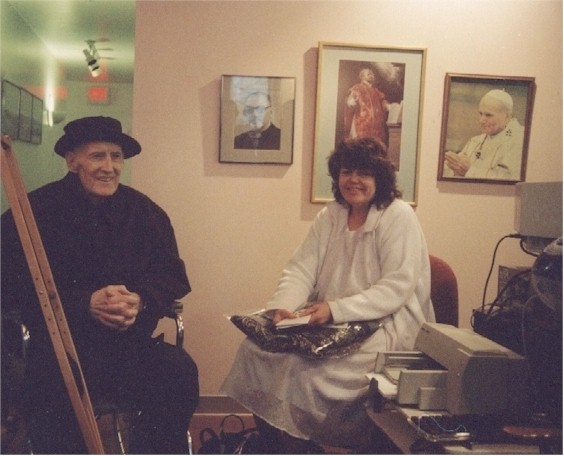
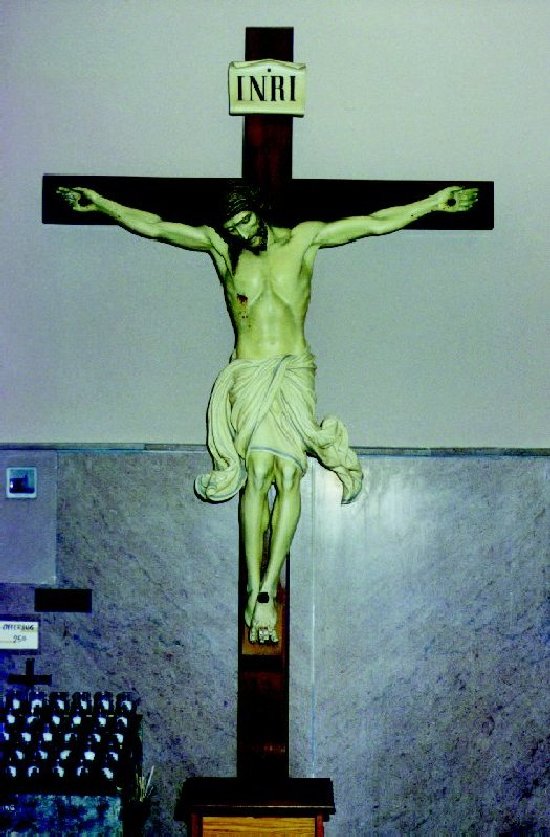

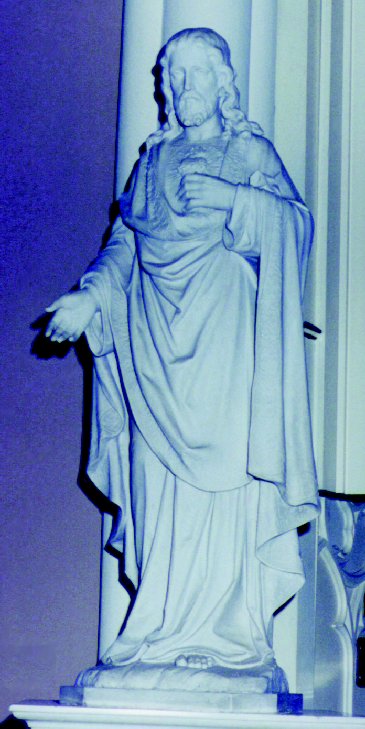

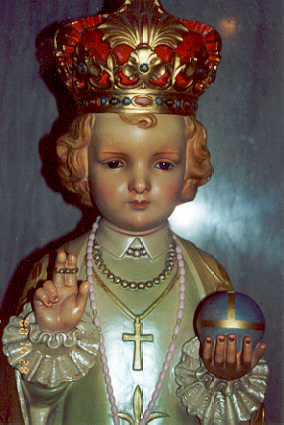
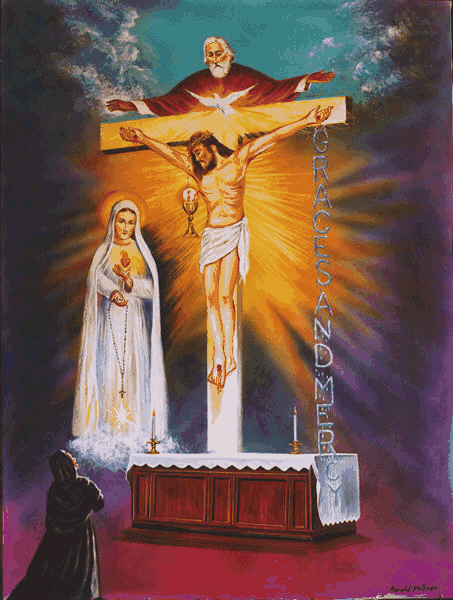








 Mary's
Message from the Rosary of August 27, 1996
Mary's
Message from the Rosary of August 27, 1996

